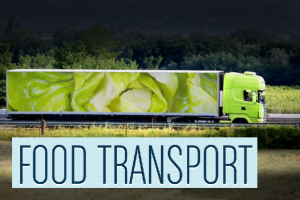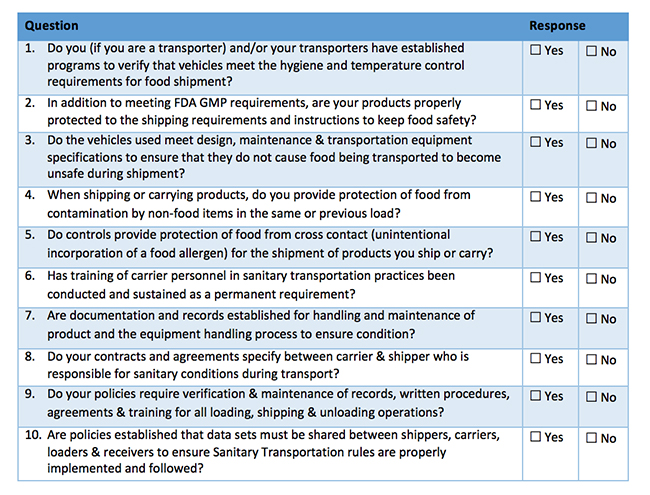FSMA Checklist: Sanitary Transportation of Human and Animal Food Rule
Help your organization assess its level of compliance to FSMA Sanitary Transportation Rule.
 The FSMA rule on Sanitary Transportation of Human and Animal Food is now final, advancing FDA’s efforts to protect foods from farm to table by keeping them safe from contamination during transportation. Sanitary Transportation is one of seven foundational rules proposed under FSMA since January 2011 to create a modern, risk-based framework for food safety. The goal of this rule is to prevent practices during transportation that create food safety risks, such as failure to properly refrigerate food, inadequate cleaning of vehicles between loads, and failure to properly protect food.
The FSMA rule on Sanitary Transportation of Human and Animal Food is now final, advancing FDA’s efforts to protect foods from farm to table by keeping them safe from contamination during transportation. Sanitary Transportation is one of seven foundational rules proposed under FSMA since January 2011 to create a modern, risk-based framework for food safety. The goal of this rule is to prevent practices during transportation that create food safety risks, such as failure to properly refrigerate food, inadequate cleaning of vehicles between loads, and failure to properly protect food.
Specifically, the Sanitary Transportation rule establishes requirements for vehicles and transportation equipment, transportation operations, records, training, and waivers. It applies to shippers, receivers, loaders and carriers who transport food in the United States by motor or rail vehicles. Additionally, it impacts shippers in other countries who ship food to the United States directly by motor or rail vehicle (from Canada or Mexico) or by ship or air, and arrange for the transfer of the intact container onto a motor or rail vehicle for transportation within the United States, if that food will be consumed or distributed in the United States. These requirements took effect April 2017 for shippers, carriers and receivers subject to the rule.
As the FSMA rules move to enforcement status, food companies must prepare to best respond to requirements and to develop programs for compliance, including Sanitary Transportation. This requires companies to document specific verification steps to satisfy regulations and meet food safety transportation requirements.
Self-Diagnostic Assessment Tool
The following self-diagnostic assessment tool can help organizations better determine their current state of planning when it comes to implementing and managing Sanitary Transportation Requirements. To complete your own assessment, review and compare your programs to the questions in Table I.

Get Compliance-Ready
Companies must have the appropriate systems in place to comply with FSMA Sanitary Transportation of Human and Animal Food requirements or face possible willful non-conformance, which can include fines and criminal penalties under FDA enforcement. The questions in Table I will help companies identify areas to consider regarding their Sanitary Transportation programs. Kestrel can also help answer questions, provide input on solutions, discuss how to better manage all your food safety requirements, and change “No” responses into “Yes” responses that promote best practices for FSMA and food safety compliance.


